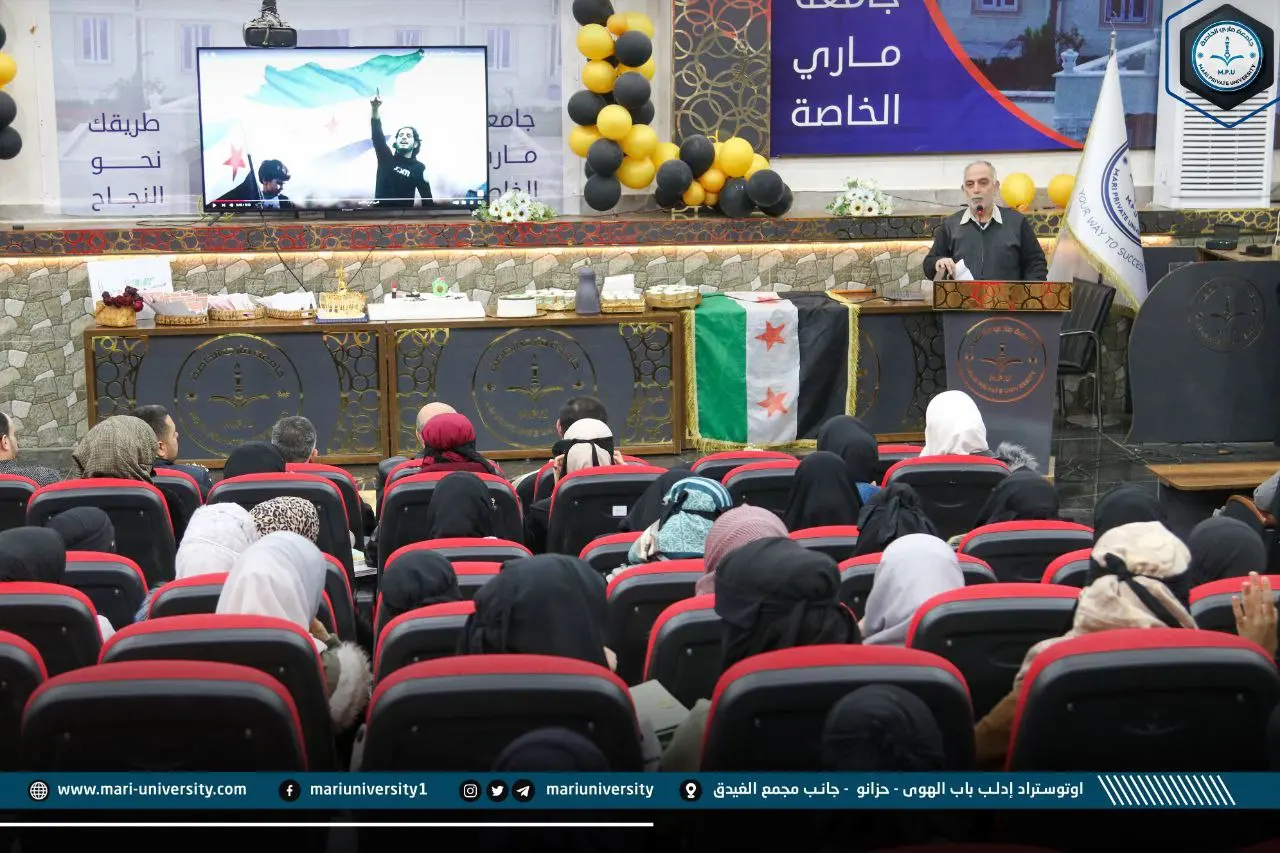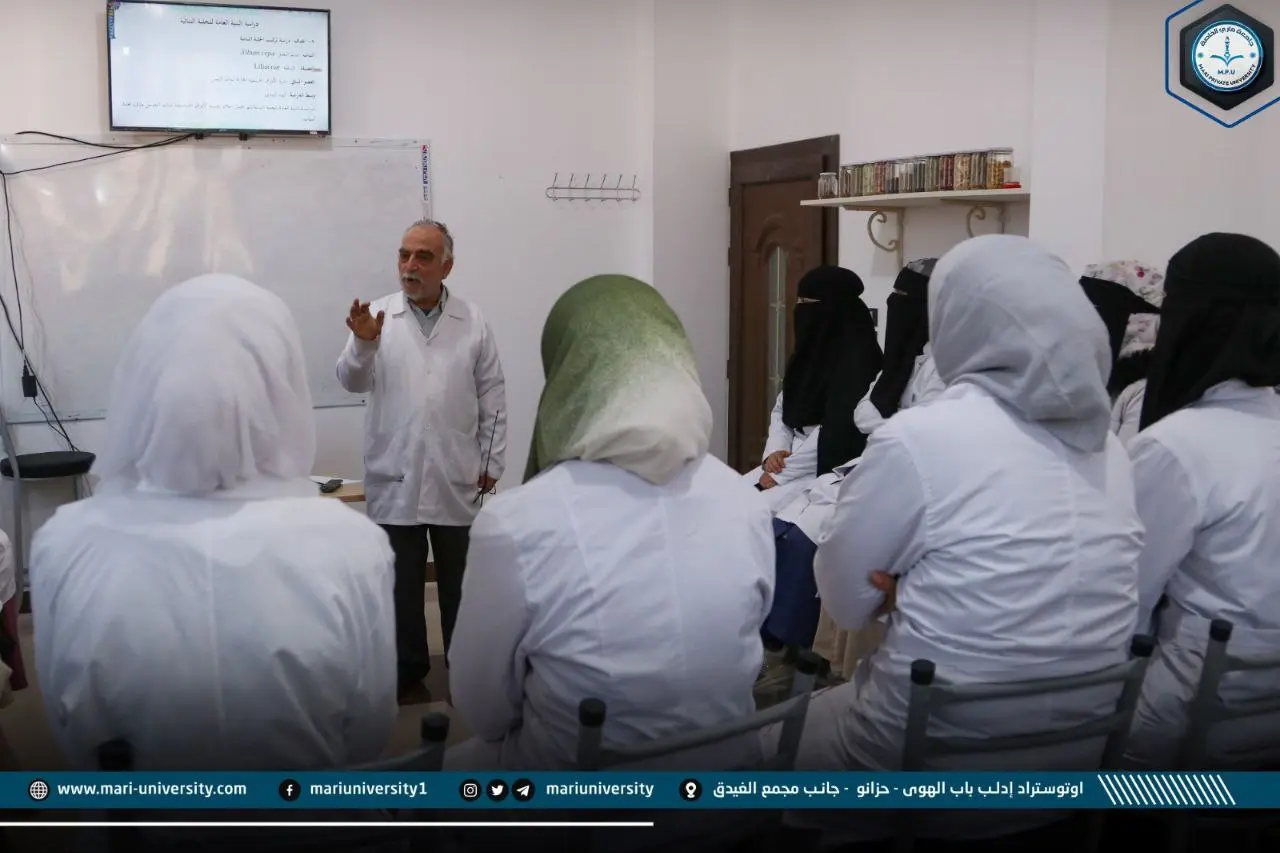College of Health Sciences – Department of Therapeutic Nutrition ... Mari your way to success
“At the College of Clinical Nutrition, we design the future of health through an integrated scientific vision that combines innovation in the field of nutrition with advanced applied training. Our academic programs prepare cadres capable of transforming nutritional knowledge into preventive and therapeutic solutions, using a research methodology based on the latest scientific evidence and keeping pace with global health challenges.
The curriculum includes a balanced mix of theoretical aspects (anatomy, biochemistry, food sciences) and practical training (case analysis, dietary design, and the use of technology in diagnosis), with a focus on unique specialties such as chronic disease nutrition, food safety, and sports nutrition.
We aim to build a generation of clinical nutritionists capable of leading change in communities by promoting health awareness, combating nutrition-related diseases, and contributing to achieving the Sustainable Development Goals for better health for individuals and communities.”



Internal Regulations of the Faculty of Therapeutic Nutrition

Introduction to the College of Therapeutic Nutrition
The Bachelor of Medical Therapeutic Nutrition program is a cornerstone of the College of Health Sciences. Launched in 2022, it aims to prepare specialized personnel capable of addressing community health challenges through the development of scientific nutritional solutions. The program aims to empower graduates to improve the health and nutritional status of individuals and families and raise community awareness of optimal nutritional patterns, contributing to disease prevention and improving quality of life.


College Vision
The college aspires to become a leading and accredited center in the field of therapeutic nutrition and its techniques at the local and regional levels, by providing an integrated package of academic, research, and consulting services that meet the highest international standards.


College Message
The college seeks to provide the local and regional markets with leading competencies in the field of therapeutic nutrition by providing an exceptional educational and research environment that stimulates innovation and adheres to the highest international quality standards. We aim to develop experts capable of leading a radical shift in the concept of nutritional therapy, by integrating the latest scientific techniques with applied expertise to provide proactive solutions that enhance community health and combat emerging nutritional challenges.





College Objectives
- Academic Leadership:
Graduating specialized cadres in therapeutic nutrition equipped with the highest scientific and practical standards, capable of providing innovative solutions to promote community health and combat nutrition-related diseases. - Certified Scientific Consultations:
Providing certified nutritional and therapeutic consultations through a specialized center that serves as a scientific reference at the local and regional levels in the field of therapeutic nutrition and dietary design. - Applied Research:
Producing evidence-based scientific research to improve nutritional practices for individuals and communities, with a focus on designing realistic solutions to promote sustainable healthy habits. - Innovation in Clinical Nutrition:
Developing functional foods and customized nutritional protocols that meet the individual needs of patients based on various disease conditions (such as diabetes, heart disease, and gastrointestinal disorders). - Strategic Partnerships:
Enhancing collaboration with governmental and private health agencies and community institutions to implement awareness programs and effective nutritional interventions that contribute to building a healthy society.
- Global Scientific Collaboration:
Establishing research and educational partnerships with leading academic departments and international institutions specializing in food science and nutrition, to exchange expertise and keep pace with global developments. - Promoting Health Awareness:
Organizing educational campaigns and community activities in cooperation with local and international organizations, to disseminate the principles of therapeutic nutrition and best preventive practices. - Leading Scientific Events:
Organizing international conferences and workshops that bring together experts and researchers in the field of therapeutic nutrition, to highlight scientific developments and encourage innovation. - Integrated Infrastructure:
Providing advanced educational and research facilities (laboratories, training clinics, digital platforms) that enable students and researchers to conduct pioneering research and apply knowledge practically.




Academic and training structure:
| Program Features:
|
The program's relationship to the university's mission: The Therapeutic Nutrition Program is one of the programs offered by the university. Therefore, the college’s vision, mission, and goals are consistent with the university’s vision, mission, and goals of leadership and excellence in producing a generation capable of keeping pace with all developments to serve its community. | Graduate Opportunities:
|
Strategic program objectives: Qualifying graduates capable of:
|
Admission requirements for the College of Health Sciences - Department of Therapeutic Nutrition
- Obtaining a General Secondary Certificate (Science/Literature) according to the requirements of the Higher Education Council.
- Passing a personal interview to assess professional inclinations and personal characteristics.
- Full-time study.
- Duration: 4 academic years (8 semesters) according to the semester system.
- Time Distribution:
- The academic year is divided into two semesters, each lasting 12 weeks.
- Study Plan: combines theoretical lectures (70%) and practical training (30%).
The appropriate default phrase to respond to the previous question (for a general answer): "To communicate directly with Mary University in Idlib, you can use one of the following methods:
- Telephone or email found on the official website.
- Visit the campus during official working hours.
- Follow the university's social media channels for the latest updates.
For more details, we recommend visiting the university's official platforms or contacting them directly. We are happy to assist you with any additional inquiries!"
Official language of instruction: Arabic.
Some specialized courses are taught in English (e.g., mental health terminology, scientific research methods).
- Attendance of at least 75% of the theoretical and practical lectures for each course is required.
- A student will be denied entry to the final exam if their attendance rate falls below the required percentage.





62
Students4
Number of years of study100
Successful (%)20
InstructorsDuties of a Therapeutic Nutritionist
1. Comprehensive Assessment and Follow-up:
| 5. Health Education and Training:
|
2. Personalized Nutrition Planning:
| 6. Quality Control and Scientific Research:
|
3. اMultidisciplinary Collaboration:
| 7. Innovation in Nutritional Care:
|
4. Community Program Management:
|


